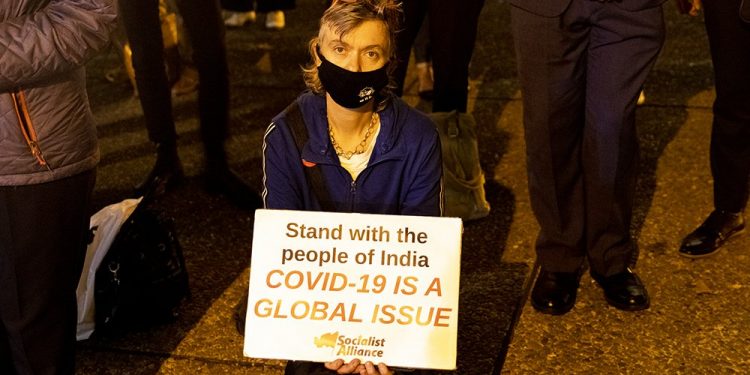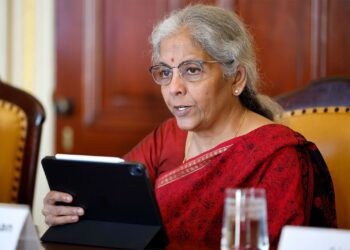The Australian Human Rights Commission (AHRC) has released a comprehensive report titled “Collateral Damage,” examining the human rights implications of Australia’s response to the COVID-19 pandemic. The report, released on Tuesday, sheds light on several controversial measures, including the 2021 India travel ban, incidents of racism, and the adverse effects on international students and other vulnerable groups.
India Travel Ban: A Breach of Fundamental Rights
In April 2021, as India faced a devastating surge in COVID-19 cases, the Australian government implemented a travel ban preventing citizens and permanent residents in India from returning home. This unprecedented move was enforced under the Biosecurity Act 2015, with penalties for breaches including up to five years’ imprisonment, a fine of $66,000, or both.
The AHRC’s report criticises this measure as a violation of the right to freedom of movement, leaving thousands of Australians stranded and exacerbating mental health crises. The Commission argues that such stringent restrictions were disproportionate and lacked sufficient justification, highlighting the need for policies that uphold citizens’ rights even during emergencies.
Racism and Human Rights: A Disturbing Trend
The pandemic period saw a troubling increase in racist incidents, particularly against individuals of Asian descent. The AHRC report documents numerous cases where people faced discrimination, verbal abuse, and physical assaults linked to COVID-19 prejudices. These incidents not only infringed upon the victims’ rights to safety and dignity but also exposed underlying societal biases that were exacerbated during the crisis.
The Commission calls for comprehensive strategies to combat racism, including public education campaigns and stronger legal protections, to ensure that all Australians are treated with respect and equality.
Impact on International Students: Neglected and Vulnerable
International students, who contribute significantly to Australia’s economy and cultural diversity, were among the hardest hit during the pandemic. The report highlights that many faced financial hardships due to job losses, lacked access to government support, and experienced social isolation. Additionally, travel restrictions prevented numerous students from returning to their home countries or resuming their studies in Australia, leading to uncertainty and distress.
The AHRC emphasises the need for more inclusive policies that consider the welfare of international students, ensuring they have access to support services and are protected from exploitation.
“While government responses to the pandemic helped save lives, our report found that human rights were not always considered or protected. This affected all Australians, with people from marginalised backgrounds or in at-risk situations seeing their harm compounded.”
– Human Rights Commissioner Lorraine Finlay
Domestic Violence Victims: Trapped and Isolated
Lockdown measures, while essential for controlling the virus’s spread, had unintended consequences for victims of domestic violence. The report notes a significant increase in domestic violence incidents during the pandemic, with victims often trapped at home with their abusers and facing limited access to support services.
One case involved a woman who, due to movement restrictions, was unable to escape her abusive partner, leading to prolonged periods of violence and trauma. The Commission urges that future emergency responses incorporate measures to protect and support domestic violence victims, ensuring they have safe avenues to seek help.
Renters and Casual Workers: Economic Hardships
The economic fallout from the pandemic disproportionately affected renters and casual workers. Many renters faced eviction threats due to loss of income, while casual workers, particularly in sectors like hospitality and retail, experienced job insecurity and inadequate access to government assistance.
The AHRC report highlights cases where individuals were forced into homelessness or severe financial distress, calling for stronger social safety nets and tenant protections to safeguard these populations in future crises.
At-Risk Groups: Overlooked and Underserved
Various at-risk groups, including the elderly, people with disabilities, and Indigenous communities, bore the brunt of Australia’s COVID-19 lockdowns. The report points out that these groups often had limited access to essential services, faced heightened health risks, and were frequently overlooked in policy decisions.
For example, abrupt and inconsistent border closures disproportionately affected border communities, disrupting access to healthcare, education, and employment. The Commission advocates for more inclusive and equitable policies that address the unique needs of these populations during emergencies.
Government Overreach: Balancing Public Health and Human Rights
The AHRC report criticises various government measures during the pandemic as overreaches that infringed upon human rights. For instance, the lockdown of public housing towers in Victoria was flagged as a severe infringement on human rights, with residents subjected to harsh restrictions without adequate support.
The Commission acknowledges the necessity of certain restrictions to protect public health but stresses that such measures must be proportionate, time-bound, and subject to regular review. It calls for a framework to address future emergencies without compromising human rights, ensuring that all policies are transparent and accountable.
Recommendations for Future Emergencies
In light of the findings, the AHRC makes several recommendations to better safeguard human rights in future emergencies:
- Establish a Human Rights Framework: Develop a comprehensive framework that ensures all emergency responses are evaluated for their human rights implications, promoting accountability and transparency.
- Enhance Support for Vulnerable Groups: Implement targeted measures to protect at-risk populations, including domestic violence victims, renters, casual workers, and marginalised communities, ensuring they have access to necessary resources and support.
- Strengthen Anti-Racism Initiatives: Launch public education campaigns and enforce stronger legal protections to combat racism, fostering a more inclusive and equitable society.
- Protect Freedom of Movement: Ensure that any travel restrictions are proportionate, non-discriminatory, and respect individuals’ rights to return to their home country.
- Support International Students: Develop policies that provide financial and social support to international students, recognising their contributions and ensuring their well-being during crises.
The Collateral Damage report serves as a crucial reflection on Australia’s pandemic response, highlighting the need for a more balanced approach that protects public health without compromising human rights. The Australian Human Rights Commission urges governments to learn from past mistakes and implement policies that ensure greater transparency, fairness, and support for vulnerable communities in future crises.
Full report
Report summary











